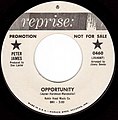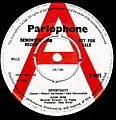Opportunity (song)
| Opportunity | |
|---|---|
| Walter Jackson | |
| publication | 1963 |
| Genre (s) | pop |
| Author (s) | John Marascalco , Warren Joyner , Robert Harshman |
| Publisher (s) | Robin Hood Music |
| Label | Columbia Records |
| Cover versions | |
| 1966 | Peter James |
| 1966 | Jason Dene |
| 1967 | Mr. Lee Grant |
Opportunity is a pop - song from 1963, that of John Marascalco , Warren Joyner and Robert Harshman was written. The first version was played by the American soul singer Walter Jackson in the same year . This was followed by recordings by Peter James and Jason Dene in 1966 . Only the New Zealander Mr. Lee Grant was able to lead the title to success in 1967 and made it to number one on the New Zealand charts . It is a rhythmic ballad that of a successful flirtation as a unique opportunity ( Opportunity told).
Creation and publication
Established on the Los Angeles music scene since his rock 'n' roll compositions for Little Richard , songwriter John Marascalco enjoyed collaborating with other musicians and songwriters to develop his songs. On October 6, 1961, he and his colleagues Robert Luke Harshman and Warren Joyner registered the copyright for the title True Love Comes But Once in the American Library of Congress . The year 1962 saw further compositional collaborations between the three, Marascalco also produced for Infinity Records Harshman under his pseudonym "Bobby Hart" and Joyner as a member of the doo-wop group The Electras . On February 11, 1963, the trio announced a revised version of True Love Comes But Once called Opportunity . The song belongs to the catalog of Marascalco's own music publisher Robin Hood Music.
Soul singer Walter Jackson moved to Columbia Records in Chicago in the early 1960s , where he and his discoverer and producer Carl Davis celebrated several small hits in the pop and R&B charts. Davis chose mostly suitable material from well-known songwriters. This is how he came across Opportunity , which had not previously been recorded by any other artist. Ray Ellis contributed an arrangement and took over the orchestral direction when recording with Jackson. The number was released along with It Will Be the Last Time on Columbia 4-42823. In 1964, the title appeared on the album It's All Over on Columbia subsidiary Okeh Records and in April 1965 Billboard magazine announced a 7-inch mini-LP with six songs, including Opportunity .
Musical structure and content
Opportunity is a song in F major and 4/4 time, the three harmonic basic functions of which are borrowed from the blues : The tonic in F major is only supplemented by the dominant C major and the subdominant B major. Formally, the song starts with a four-bar intro on the dominant, which also introduces the distinctive rhythm: after three accented beats on the beats of the bar, the beat becomes syncopated with an eighth note on the three . This rhythmic figure can be found in all three stanzas and the following refrains, with the exception of some instrumental pauses, the stop times.
The stanza consists of four verses of four bars. The first two verses are both melodious and harmonious with their change from tonic to dominant, their seventh chord and back to the tonic, reminiscent of the number 1 hit Save the Last Dance for Me by the Drifters from 1960. The electronic organ also answers a brief objection to the verse sung. The more dramatic second part of the verse, the arrangement of which provides for a background choir and strings, starts with four bars on the subdominant B flat major. With the subsequent change via C, the expected resolution to F major follows . The eight-bar refrain only alternates between C and F major and offers a classic call and response element through the repetitive use of the background .
The song tells the story of a flirt from the perspective of a man who visits a dance bar. In the first verse, he notices a woman's smile and delights in her perfume. The second stanza describes an intimate dance in which the narrator asks himself whether he should dare to accompany his new acquaintance home. For the third verse, both are on the road as lovers in the starry night and are amazed that they were completely strangers an hour earlier. The chorus emphasizes the moral of the story is that a golden opportunity ( Opportunity ) is to grab by the hair: True love would come once in a lifetime ( True Love Comes But Once ). This realization is addressed twice to the singer, to his accompaniment in the chorus after the third verse.
Cover versions
Little is known about the first cover artist, Peter James . In April 1966, his version of the piece appeared on Reprise Records along with the classic Misirlou . Jimmy Boven took care of the arrangement and Don Lanier was responsible for the production. In 2009, fellow musician Wes Bryan dispelled the longstanding rumor that Peter James was a pseudonym of PJ Proby .
Also in 1966 a cover version of the largely unknown Jason Dene was released on the British label Parlophone under the number R 5485 . Cy Payne was the musical director and Tony Hiller was responsible for the production . Hiller announced on his YouTube channel in 2014 that "Jason Dene" was a pseudonym for AJ Cook, the brother of the English songwriter Roger Cook .
New Zealand actor and singer Mr. Lee Grant was at the height of his career in 1967 with regular appearances on the television show C'mon . He toured with Animals and Dave Dee, Dozy, Beaky, Mick & Tich in the middle of the year when his label His Master's Voice released a single with Opportunity and Spicks and Specks , a cover of the Bee Gees hit . Garth Young had arranged the backing music and was also the band leader on the Nick Karavias- produced recording. Grant recalled the music in 1993: “A sound engineer named Nich Karavias dug up this song Opportunity . It was in a completely different rhythm: I tried to imitate the rhythm of the Spencer Davis Group's hit Gimme Some Lovin ' . "In terms of content, the music journalist Murray Cammick said:" Although Grant's hit singles were only covers, there was a vaguely autobiographical one Reference. With his appearances in the series C'mon the good opportunity knocked on him. ”( Opportunity is knocking at his door. ) In the following year an edition of the song came on Columbia Records on the Australian market.
Importance, Criticism, and Success
|
Chart positions Explanation of the data |
||||||||||||
| Singles | ||||||||||||
|
||||||||||||
Both the original by Walter Jackson and the British edition by Jason Dene were all but ignored by critics and the public. Only the cover version of Peter James has been given a benevolent preliminary review by Billboard Magazine . It is “a thrilling, varied record with enough momentum to become a hit. Voice, lyrics and production are excellent. James' interpretation is strong and convincing. ”That hope was not fulfilled.
Things turned out completely different in New Zealand: Mr. Lee Grant's producer Nick Karavias originally planned Spicks and Specks as the A-side of the single. However, after the great success of the original abroad, a re-release had just moved to the top of the New Zealand charts, so that the record company did not want to compete with Mr. Lee Grant's single. Logically, the rather unloved opportunity switched to the A side. The record debuted at number 17 on the New Zealand music charts on May 19th . Five weeks later, Opportunity topped the leaderboard, launching a series of six of the entertainer's top ten hits. For 10,000 units sold, the label boss Alfred Wyness was able to present the singer with a silver record.
Individual evidence
- ↑ a b Public Catalog . In: Library of Congress . Retrieved January 19, 2019.
- ^ Billboard: Here Are More Little LPs . In: Billboard April 3, 1965, p. 63.
- ↑ Wes Bryan: The Mystery of Peter James - No He Is not PJ Poby , November 20, 2009, accessed January 23, 2019.
- ^ Tony Hiller: Opportunity. Jasen (sic!) Dene . In: Youtube. July 26, 2017, accessed January 18, 2019.
- ↑ a b c d e Murray Cammick: Mr Lee Grant - part 1 . In: Audio Culture. The noisy library of New Zealand music . October 25, 2016, accessed January 16, 2019.
- ↑ Lyn Nuttall: Mr Lee Grant: Opportunity In: PopArchives.com.au. Where did they got this song? , accessed November 16, 2018.
- ↑ Billboard Magazine, April 16, 1966, p. 18.
- ↑ Bruce Sergent: Mr Lee Grant In: New Zealand Music of the 60's, 70's and a bit of 80's. Artists A - K. , accessed November 16, 2018.






